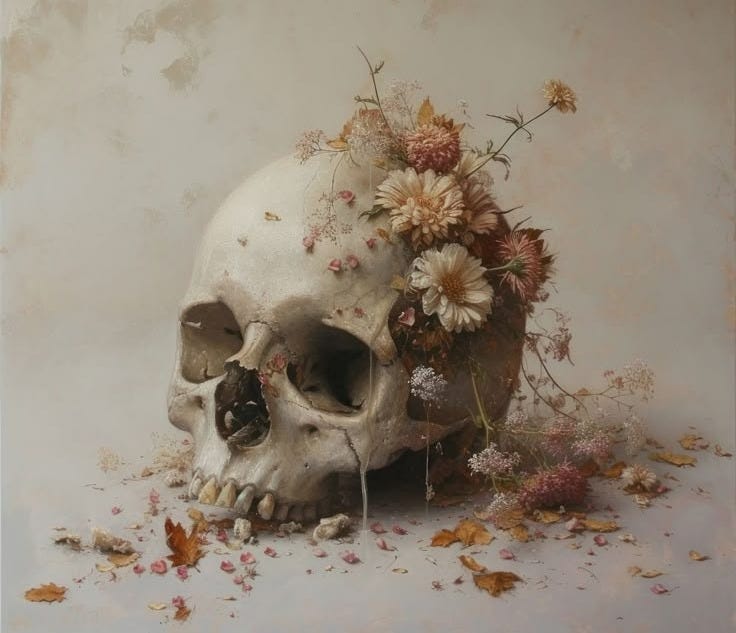If today were your last day
What you would do differently if you remembered that time is running out
🏷️ Categories: Life lessons, Time.
This is not a sad letter. Not entirely, at least. But it is a letter about death.
We spend our lives avoiding the topic, as if ignoring it could make it any less real. And yet, what an irony—it is precisely the awareness of it that gives meaning to everything else. Understanding that it is inevitable will make you live without regrets and with a deep appreciation for every moment.
Accepting death, rather than avoiding it, changes the rules of the game.
Here are five reflections on death that will change your perspective on life.
1. Death clarifies what matters
Imagine you only have six months to live.
Would you keep doing what you're doing today?
Would you stay around the same people?
Would you keep postponing what you’ve been putting off for so long?
The problem is that we live as if we were eternal.
We worry about what others think, chase things that don’t truly fulfill us, and waste an immense amount of time on trivialities. We are not really aware of how we spend our time; we measure time with clocks, but we don’t measure what we spend it on.
But when we realize that life is finite, everything changes.
Suddenly, other people’s expectations stop mattering. The fear of failure disappears. And only one question remains: What really matters to me?
Steve Jobs received one of the hardest pieces of news anyone can hear. Doctors diagnosed him with pancreatic cancer and told him he had only six months to live. With that in mind, he said this to university students in the U.S.:
"When I was 17, I read a quote that went something like this: 'If you live each day as if it were your last, someday you’ll most certainly be right.' It made an impression on me, and since then, for the past 33 years, I have looked in the mirror every morning and asked myself: 'If today were the last day of my life, would I want to do what I am about to do today?' And whenever the answer has been 'No' for too many days in a row, I know I need to change something."
"Your time is limited, so don’t waste it living someone else’s life. Don’t be trapped by dogma—which is living with the results of other people’s thinking. Don’t let the noise of others’ opinions drown out your own inner voice. And most important, have the courage to follow your heart and intuition. They somehow already know what you truly want to become. Everything else is secondary."
— Steve Jobs, Stanford University Commencement Speech, 2005.
Asking yourself this question regularly will give you brutal clarity about what is essential and what is not. And that clarity is what will allow you to live without regrets.
2. Decisions become easy
If you knew your time was limited, you would make decisions faster.
Paralysis by analysis would disappear. You wouldn’t waste years in a job you hate. You wouldn’t postpone important conversations or reconnecting with friends you haven’t seen in a long time. You wouldn’t hesitate to reach out to all those people you once said, “Let’s catch up someday.” You wouldn’t keep doubting whether to take that risk you’ve been avoiding—the one you know could change your life. There’s no room for “later.”
Death forces us to decide and prioritize.
We can’t afford to wait endlessly. And, interestingly, when we accept mortality, we free ourselves from the fear of making mistakes. Because when you look at your entire life as a whole, the only real mistake is wasting time on things that don’t give it meaning.
Think about this: What are you postponing today that you would do immediately if you knew your time was limited? From there, you can begin to prioritize what matters.
For me, the answer was clear: writing.
3. It pushes you to live an authentic life
Bronnie Ware is a nurse who documented the five most common regrets of people before they die. Just reading them is painful…
I wish I had lived a life true to myself.
I wish I hadn’t worked so much.
I wish I had expressed my feelings more.
I wish I had stayed in touch with my friends.
I wish I had allowed myself to be happier.
Do you notice a pattern?
All these regrets are avoidable if you become aware in time. They realized too late what Steve Jobs warned the students about: “Don’t let the noise of others’ opinions drown out your own inner voice.”
Death is a reminder; it helps us avoid this mistake.
It pushes us to be authentic, to ensure we are living in alignment with our values, not someone else’s. You say “no” to what doesn’t resonate with you. You surround yourself with people who truly add to your life. And, most importantly, you stop doing things out of obligation and start doing them out of conviction—because you love them.
4. You cultivate deep gratitude for life
We take it for granted, but every day is a gift that not everyone gets.
When you live without thinking about death, the smallest inconvenience can ruin your day. You focus so much on what’s missing that you forget to enjoy what you already have.
When you remember that everything is fleeting, each day becomes valuable. It makes you appreciate everyday moments more. Conversations become richer, hugs feel warmer, and life becomes fuller. It’s not about living in fear—it’s about living with intention. With the certainty that every day counts.
There’s no guaranteed “later.” The only thing you are assured of is now.
A useful technique for valuing what you have is the gratitude journal (Wiseman, 2010):
Relive a memorable experience in your journal.
Reflect on the role someone plays in your life.
Recall recent things that made you happy.
Think about a kind action someone did for you.
It can be small or big—it doesn’t matter. What matters is appreciating what you already have but often overlook. Studies have shown that within just a few weeks, this improves well-being and reduces dissatisfaction (Wiseman, 2010).
5. It makes you resilient
Death is a mystery. We don’t know what comes after. We have no definitive answers. And that’s scary. But we can also see it another way: as an invitation to curiosity. To explore. To embrace uncertainty instead of resisting it.
I think about Eastern cultures, about Buddhism, about Mexico and its Day of the Dead…
People who talk openly about death are more resilient.
During the pandemic, a study found that such individuals suffered less anxiety and adapted better to hardships. It’s not that they were insensitive—it’s that they had learned to coexist with life’s uncertainty (Scrivner et al., 2020).
Death is not an enemy.
It is a reminder. A teacher that teaches us to value what we have. Sometimes, we get caught up in routine, but we can pause. Breathe. Ask ourselves: Am I living the way I truly want? And if the answer is “no,” do something about it.
Because in the end, the best way to prepare for death is to ensure that, when it comes, we can say without hesitation: I lived fully.
✍️ Your turn: If you knew you only had six months to live, what would you change today?
💭 Quote of the day: “It is the unknown we fear when we look upon death and darkness, nothing more.” — J.K. Rowling.
See you in the next letter, take care! 👋
References 📚
Jobs, S. (2006, february). Steve Jobs Commencement Address at Stanford 2005. Academy At The Lakes. URL
Scrivner, C., Johnson, J. A., Kjeldgaard-Christiansen, J., & Clasen, M. (2020). Pandemic practice: Horror fans and morbidly curious individuals are more psychologically resilient during the COVID-19 pandemic. Personality And Individual Differences, 168, 110397. URL
Wiseman, R. (2010). 59 seconds: Think a Little Change a Lot. Pan Macmillan.








Very insightful piece. Many of the listed items have fallen into place. I guess that's what is called "self-actualization." I dare say, by the time one is 75, that level should've been reached in some facets of our lives. Old friends may have passed into personal history because they presented their gifts to us and went on their merry ways. What's sad is to try to keep in touch with people who have gone into geriatric care facilities. We may never know if or when they passed away. They just disappear.
beautifully crafted essay, alvaro! i almost avoided reading, it scared me. but of course, i had to read this poignant essay of yours. question for you: can we truly live a life without regrets? i am thinking no, we cannot. even when we live in the now and are leading fully-lived lives. something tells me regret is as natural a feeling as say, yearning, boredom, envy, self-doubt. and perhaps, having regrets are a way to learn to live more fully, more authentically. i'm thinking a life without some regrets, large or small is wishful thinking, somehow. ok, keep going. for me, this essay rings with your unique authenticity, above and beyond the subject of the essay. well done. ur fan, j.